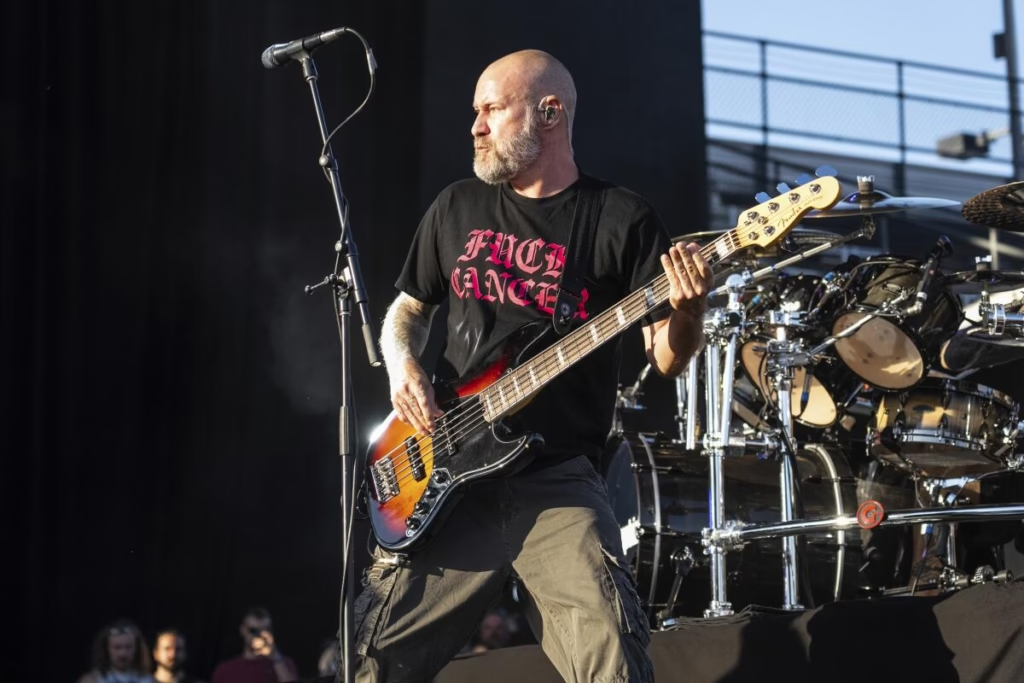JACKSONVILLE – The nu-metal community was shaken on Saturday as Limp Bizkit confirmed the death of co-founder and bassist Sam Rivers at 48. The band shared the news in an emotional Instagram post, calling him their “heartbeat” and “pure magic.”
Sam Rivers died on 18 October 2025. No cause was given, though people close to him suggested complications linked to long-term liver disease could be involved, a condition he had previously fought through with a transplant.
Born Samuel Robert Rivers on 2 September 1977 in Jacksonville, Florida, he became far more than a bassist. Sam Rivers served as the calm centre of a group that helped define late ’90s and early 2000s heavy music. Limp Bizkit’s statement spoke of a brother and bandmate whose presence grounded the chaos of their sound. The post, paired with a stark black-and-white stage shot, closed with a simple promise that his music would live on.
Rivers’ story with the band started in sweaty Jacksonville clubs. As a teenager, he played tuba with his cousin, future drummer John Otto, before moving to bass and guitar. A brief stint working with Fred Durst at Chick-fil-A led to their first project, Malachi Sage. In 1994, Sam Rivers, Durst, and Otto formed Limp Bizkit. Wes Borland and DJ Lethal soon joined, and the group rose quickly from local rooms to global tours.
The Groove That Powered Nu-Metal
Rivers did not chase the spotlight. He built foundations. His lines fused hip-hop swing with thick guitar riffs, creating tension with Durst’s vocals and turning songs like Break Stuff into anthems. The debut, Three Dollar Bill, Y’all (1997), built a slow buzz.
Then Significant Other (1999) arrived and everything changed, shifting millions of copies worldwide and earning a Grammy nomination for Best Rock Album. Fans still point to Nookie and Re-Arranged as prime examples of his slippery, syncopated style.
The follow-up, Chocolate Starfish and the Hot Dog Flavoured Water (2000), entered at No. 1 on the Billboard 200 and sold a million copies in week one, outpacing peers at the time. Rivers’ role grew when Wes Borland left ahead of Results May Vary (2003).
He picked up the guitar on several tracks and co-wrote songs, including Creamer and Lonely World. Across six studio albums, the band moved more than 40 million records, with Rivers anchoring every era.
Awards followed, even as the band’s image split opinion. Rivers won Best Bass Player at the 2000 Gibson Guitar Awards, drawing praise from peers such as Flea. Limp Bizkit collected a Billboard Music Award for Top Modern Rock Artist in 2001 and earned three Grammy nominations, including Best Hard Rock Performance for Take a Look Around.
Outside the band, Sam Rivers produced Jacksonville groups like Burn Season and Indorphine, and appeared on tracks including Marilyn Manson’s Redeemer and David Draiman’s Forsaken. On stage, his LED-lit bass guitars became part of the spectacle, with endorsements spanning Ibanez, Warwick, and Fender.
Life on the road took its toll. Years of constant touring, from Woodstock ’99 to Ozzfest flashpoints, weighed heavily. In 2015, he left the band. It was first linked to back problems, then later revealed in Jon Wiederhorn’s book Raising Hell: Backstage Tales from the Lives of Metal Legends as a serious liver condition tied to alcohol.
Sam Rivers described hitting a wall, quitting drinking, and receiving a successful transplant. He returned in 2018, sober and energized, playing recent singles like September’s Making Love to Morgan Wallen and delivering storming sets while opening for Metallica this year.
Tributes for Sam Rivers Flood In
Grief spread fast. DJ Lethal urged fans to celebrate Rivers by spinning his bass lines all day, calling the band “in shock.” Social feeds filled with grainy late-’90s clips and stories from listeners who grew up with his sound. On Reddit’s r/numetal, threads drew waves of condolences and memories of the chemistry between Sam Rivers, Otto, and Borland.
On X, fans and artists shared their loss. Posts called him a founder and a “legend,” and asked how 2025 could bring so many farewells. Australian fan page @LimpBizkitAus wrote of feeling “lost” and without words. A Spanish tribute from @highfrequencym said nu-metal had lost one of its pillars, and that his groove powered a generation.
Musicians added their voices. Wes Borland posted an artwork of a broken bass string with the caption, “The low end fades.” Fieldy from Korn remembered Rivers’ smooth groove and steady presence during the chaos of Ozzfest. Mike Shinoda praised Rivers as the foundation that let the band’s frontman soar.
Fans who saw Limp Bizkit on recent dates with Metallica shared photos from rain-soaked shows and spoke of shock and gratitude. Others turned up the classics, from Rollin’ (Air Raid Vehicle) and My Way to Behind Blue Eyes. One street performance of Nookie drew a crowd that chanted his name.
Sam Rivers is survived by his wife, former adult film performer Roxie McMahon, and a close-knit family that includes cousin and bandmate John Otto. Public memorial plans have not been announced. The group asked for privacy as they mourned. The timing is especially raw, with the band having teased new music only weeks ago.
He did not posture or shout the loudest. He made the songs swing. His arc, from retail shifts in Jacksonville to Wembley, and from severe illness to a powerful comeback, speaks to grit and craft. The band summed him up as effortless, unforgettable, and kind.
Sam Rivers’ bass will not fall silent. It will keep rattling garage doors, festival fields, and headphones for years, a reminder that groove ties the chaos together.















